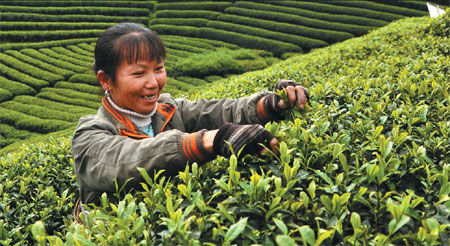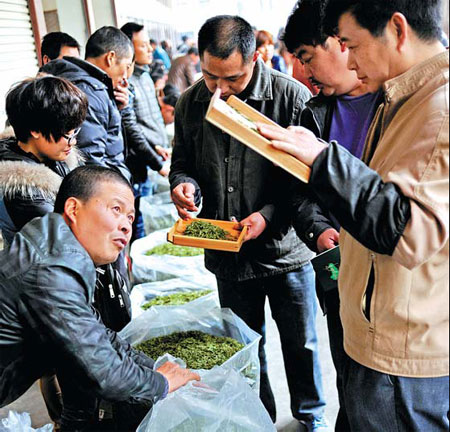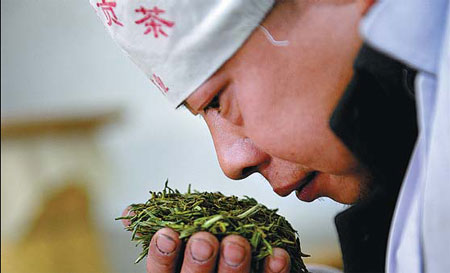Tea time loses its popularity
Updated: 2013-04-05 09:16
By Wu Yiyao (China Daily)
|
|||||||||||
|
A woman picks tea leaves on March 20 at Buyang village, Sanjiang Dong autonomous county in Guangxi Zhuang autonomous region. The Sanjiang area boasts more than 9,500 hectares of tea plantations and more than 200,000 tea farmers. Yang Ming / for China Daily |
|
A busy market trading mingqian tea in Songyang county, southwestern Zhejiang province. Liang Zhen / for China Daily |
|
A tea roasting technician judges the fragrance of tea leaves. Ou Dongqu / Xinhua |
Farmers feel the pinch of official squeeze on spending in campaign against extravagance
The early bird catches the worm, and that used to be the case for the producers of Longjing tea, as the early tea harvested before Qingming (Pure Brightness) Festival used to reap them high rewards. However, this year the bottom has fallen out of the market and prices have plummeted.
"This year the price of the premium Longjing tea picked before Pure Brightness Day is 50 percent less than it was last year. Last year it was 8,000 yuan ($1,300; 1,005 euros) per kilogram, this year it's 4,000 yuan," said Mei Chongliang, a tea producer in Meijiawu, one of the four famous tea-growing areas around Hangzhou, Zhejiang province.
The Longjing tea produced before Qingming Festival, which is known as mingqian tea, is regarded as the finest of teas, and Mei and his family have profited from the high prices the prized tea has fetched in previous years.
Mei is a certified tea roaster, and his family is involved in the entire tea production process, from cultivation of the plants to the roasting of the leaves. They have a three-story house, which is divided into living accommodation, a tea production room and a teahouse.
But not only will they get less for their tea this year, Mei said the costs have risen in every stage of the production process.
"The cost of cultivating and maintaining the trees is rising - about 10 percent in the last production cycle. We are paying the tea pickers 100 yuan a day this year, up from 80 yuan last year, and other costs such as the power for the roasting are also up," he said.
Like many of his neighbors, Mei blames the sharp drop in price on the shrinking orders from wholesale dealers.
The usual throng of tea dealers and visitors, which has crowded the narrow street through the village in previous years, has not been in evidence this year.
"Last year there were so many people between 7 am and 8 pm that my staff couldn't handle them and I had to hire six extra workers," said Weng Qianmei, a teahouse owner in the village.
The nationwide campaigns against extravagance and corruption are the reasons there are less buyers this year. Traditionally a portion of the production was reserved for government officials, and as a highly prized commodity the tea was also used as a gift or bribe.
"The price of our tea is high - but if you consider the costs, you'll see that it is reasonable," said Zhu Yundao, a 62-year-old tea farmer.
Zhu said if a kilogram of tea is sold to wholesalers for 8,000 yuan and then sold on to retailers for about 10,000 yuan per kilogram, these are reasonable prices.
"People work hard and get paid. But the high prices reported in newspapers and TV programs are not the real incomes of the farmers or dealers. What's the reason for the 120,000 yuan per kilogram the tea fetches at auction?"
In olden days mingqian tea was considered to be worth its weight in gold.
"It's a limited treasure," said Weng Qianmei. "There are 365 days in a year, but only 15 of them produce mingqian tea."
The high esteem of mingqian tea can be traced back to the days when the Day of Pure Brightness, the 104th day after the Winter Solstice, was the day the emperors received tributes from across the nation. Although voluntary at first, in the Tang Dynasty (AD 618-907) officials were dispatched to supervise the collection of tea, and the tea farmers had to rush the tea from the tea growing areas around Hangzhou to the capital Chang'an, modern day Xi'an, within 10 days to make sure the tea arrived on time.
This year, due to the warmer weather, production of mingqian tea began about two weeks earlier than usual. Some tea farmers started picking the leaves as early as March 10, instead of the traditional March 25, which means that the production period for ming-qian tea may be longer than usual.
"We can't wait, otherwise the fragrance of the tea leaves will disappear. The leaves grow too fat, and all the delicacy of the jade-like leaves fades away," said Ma Qingfang, a 46-year-old tea picker.
Longjing tea leaves are roasted soon after picking to stop the action of the natural enzymes. This is a vital process that brings out the fragrance and flavor of the tea. It requires skill and experience to bring out the best in the tea, as the art of tea roasting is the manipulation of time and temperature. The tea leaves are baked in large metal woks, which can be up to a meter in diameter, and the roasters have to be sensitive to the heat and press the fresh tea leaves against the bottom of the wok to make the water evaporate. Too much heat may damage the delicate leaves.
For Tao Enqian, a tea buyer from Shanghai, the drop in prices is good news as it means the good teas will be more affordable and not just reserved for officials and the wealthy.
"This year no one is snatching the good things from my hands," said Tao, who bought 3 kilograms of the Meijiawu Longjing tea this year to give to his family.
Tea enterprises are also preparing to lower the proportion of high-end tea and enhance sales of excellent middle-market tea, said Luo Liewan, who is in charge of the tea sector with the Zhejiang provincial department of agriculture.
"It is good for consumers and market players to see more affordable tea products. After all, tea is a day-to-day consumed beverage," said Luo.
wuyiyao@chinadaily.com.cn
(China Daily 04/05/2013 page3)
Today's Top News
List of approved GM food clarified
ID checks for express deliveries in Guangdong
Govt to expand elderly care
University asks freshmen to sign suicide disclaimer
Tibet gears up for new climbing season
Media asked to promote Sino-Indian ties
Shots fired at Washington Navy Yard
Minimum growth rate set at 7%
Hot Topics
Lunar probe , China growth forecasts, Emission rules get tougher, China seen through 'colored lens', International board,
Editor's Picks

|

|

|

|

|

|








